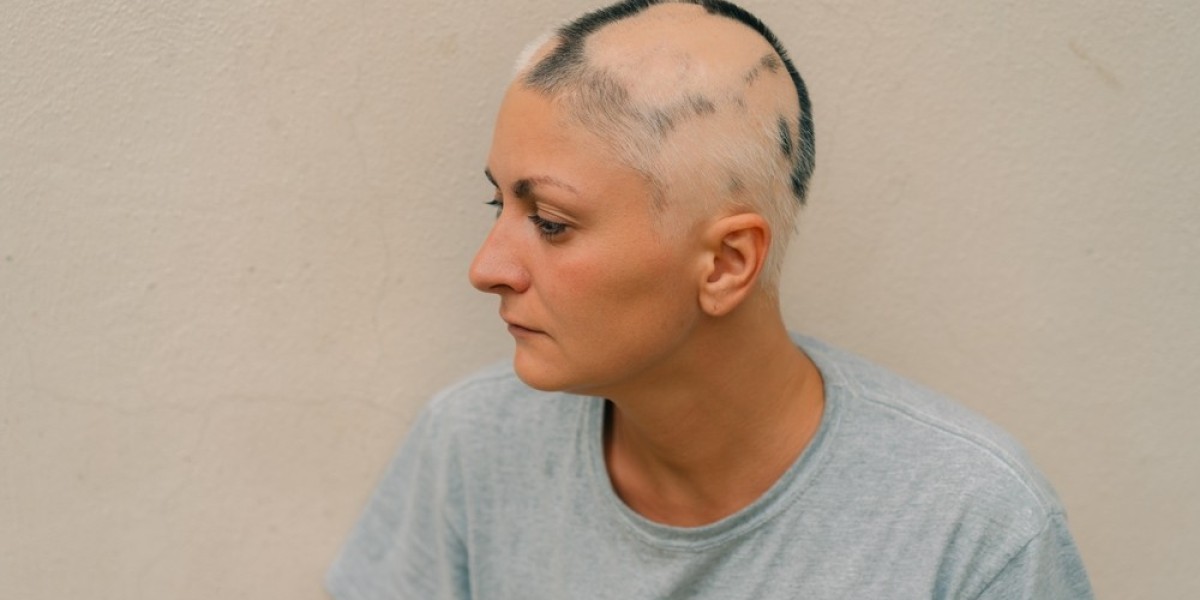Life can often feel like a rollercoaster, with ups and downs, twists and turns, all moving at a speed that sometimes feels out of control. This ride can take a toll on us, not only emotionally but physically as well.
For many people, stress doesn’t just sit in the mind; it is exhibited in the body, often in unexpected ways. One such impact is Alopecia Areata, a condition where sudden hair loss leaves round patches on the scalp or other parts of the body.
Continue reading to understand what alopecia areata is, its symptoms, how stress plays a role in developing this condition, and ways to manage it.
What is Alopecia Areata?
Alopecia Areata is an autoimmune condition where the immune system, which usually protects us from harmful invaders, mistakenly attacks hair follicles. This leads to hair loss, often in small, round patches. The condition is unpredictable, some individuals may lose a few patches of hair, while others may experience more extensive hair loss.
What are its Symptoms?
The most common sign of Alopecia Areata is hair loss. Here are some key symptoms:
Patchy Hair Loss: Small, round, or oval bald patches can appear on the scalp, beard, or other areas of the body.
Changes in Nails: Some individuals may notice changes in their fingernails or toenails, such as dents, ridges, or white spots.
Itching or Tingling: Some may experience a tingling or itching sensation before the onset of hair loss.
The onset of Alopecia Areata can be sudden, and the extent of hair loss can vary from person to person. Hair may regrow on its own, but the condition can also be recurrent.
The Causes
Alopecia Areata is an autoimmune disorder, which means the body's immune system attacks its own tissues. In this case, it targets the hair follicles. The exact reason why this happens isn't fully understood, but several factors are believed to play a role:
Genetics: If someone in the family has Alopecia Areata or another autoimmune condition, there is an increased likelihood of developing it.
Immune System Malfunction: The immune system, which usually protects the body, mistakenly attacks healthy hair follicles.
Environmental Triggers: Certain triggers like infections, physical injury, or major life changes can potentially contribute to the onset of Alopecia Areata.
How Does Stress Affect Alopecia Areata?
Now, let’s focus on the main point, how stress plays a role in developing Alopecia Areata.
Stress can feel like an uninvited guest and for those dealing with Alopecia Areata, it can do more than just affect your mood. Stress is thought to be a potential trigger for Alopecia Areata, as it can affect the body’s immune response. When an individual experiences stress, the body releases certain chemicals and hormones, like cortisol, which can interfere with the immune system’s balance.
In the case of Alopecia Areata, stress is believed to potentially disrupt the immune system, prompting it to target the hair follicles. This means that during periods of intense emotional or physical stress, some people might notice new patches of hair loss or worsening of existing symptoms.
It becomes a bit of a cycle, the stress of losing hair can lead to even more stress, potentially aggravating the condition. For many individuals, the fear of losing more hair creates a continuous loop of anxiety, making the condition even harder to manage.
Tips to Manage Stress and Alopecia Areata
Living with Alopecia Areata can be emotionally challenging, but learning ways to manage both alopecia areata and the stress associated with it can make a big difference. Here are some strategies to consider.
Practice Stress Management Techniques
Mindfulness and Meditation: These can help in staying grounded and manage overwhelming thoughts. A simple practice of taking ten deep breaths when you feel stressed can also help calm the nerves.
Physical Activity: Exercise releases endorphins, the body’s natural mood lifters. Even a daily 20-minute walk can have significant stress-reducing benefits.
Therapy and Counseling: Sometimes, speaking to a mental health professional can provide valuable support. Cognitive-behavioral therapy (CBT) is often effective in helping individuals manage stress and the emotional impacts of hair loss.
Take Care of Your Body
Balanced Diet: Eating a nutrient-rich diet full of vitamins and minerals like zinc, biotin, and iron can support hair health. Omega-3 fatty acids, found in foods like salmon and walnuts, can also help reduce inflammation.
Sleep Well: Lack of sleep can heighten stress, which can, in turn, impact your immune system. Establish a calming bedtime routine to help ensure quality sleep.
Seek Medical Treatment Options
Topical Treatments: Doctors may prescribe corticosteroid creams or other topical solutions to help reduce inflammation and encourage hair regrowth.
Oral Medications: In more severe cases, doctors might suggest oral medications that suppress the immune system, helping to prevent the immune attack on hair follicles.
Alternative Therapies: Acupuncture and essential oils are sometimes used as complementary therapies. While evidence of their effectiveness is still mixed, some individuals find them beneficial in managing both stress and symptoms.
Connect with Others
Support from family, friends, or support groups can be a huge source of comfort. There are many online and in-person support groups for individuals dealing with Alopecia Areata. Sharing experiences with others who understand can reduce some of the stress and emotional burden.
Practice Self-Compassion
Hair loss can affect self-esteem and emotional well-being, but it is important to remember that personal value is not tied to hair. Wearing wigs, hats, or scarves can help some individuals feel more comfortable in social settings, but it’s equally okay to embrace a natural look. Finding what makes an individual feel confident is key.
Conclusion
Living with Alopecia Areata can be challenging, but it's important to remember that you are not alone, and there are ways to regain a sense of control. Stress is a significant factor in the condition, but by managing stress and seeking appropriate treatments, many people find that they can reduce hair loss and even promote regrowth. While there's no one-size-fits-all answer, living a balanced life, taking care of your mental and physical health, and reaching out for support can make a big difference in your journey.









